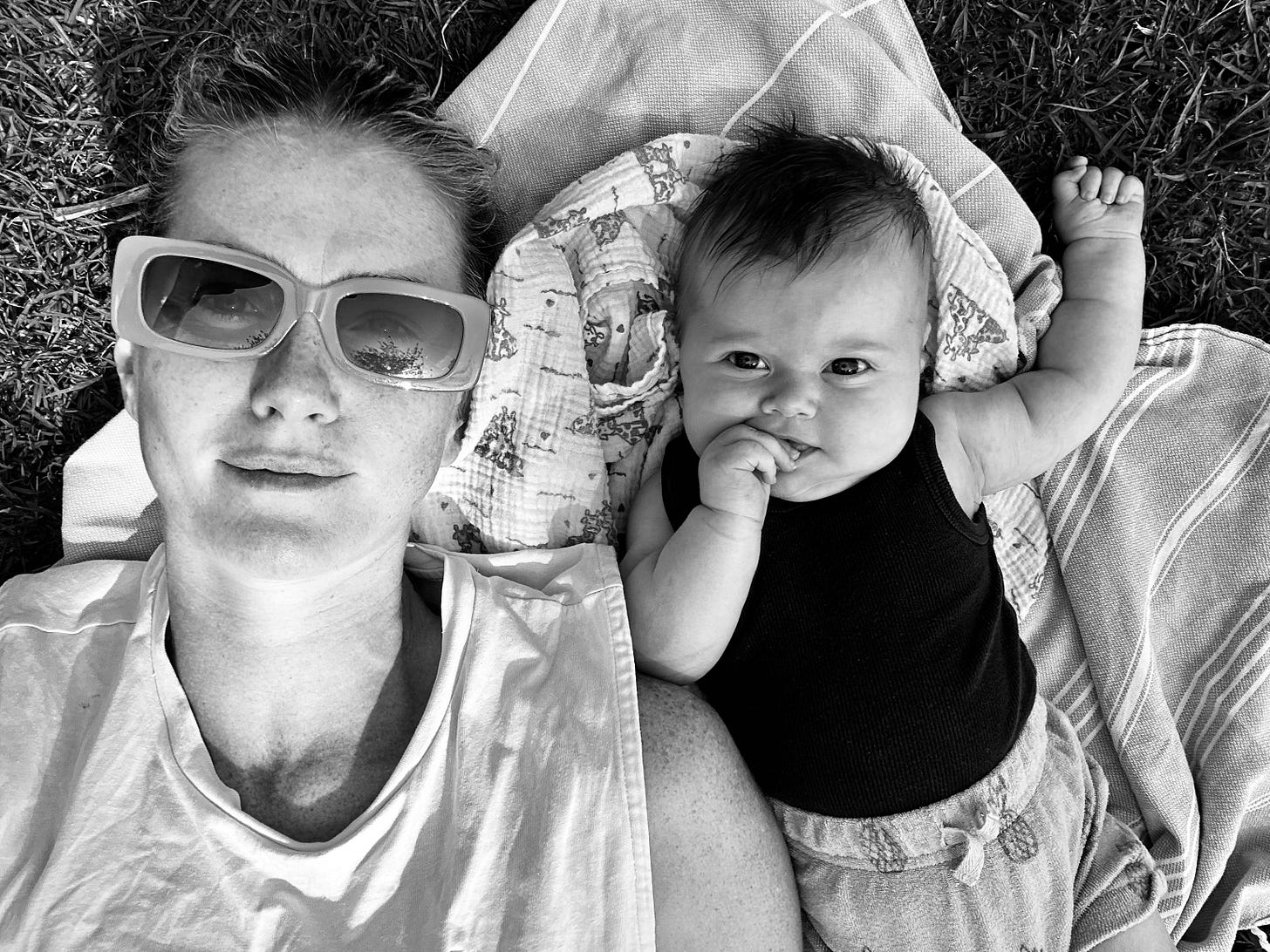When I came home from the hospital with my newborn baby in tow, one of the first questions I was asked by well-meaning friends and strangers alike was: so, when do you think you’ll go back to work?
At the time I didn’t think much of it. After all, this question is just one of the small talk tools we use as adults to connect with one another and find a point of commonality. It’s about as in depth as: how’s the weather? What do you do? Or (dreadfully), so, where did you go to school? Given that I’m also a freelancer, I kind of shrugged off the question as the assumption is likely that perhaps I have to, or want to return to my business earlier than someone with a more ‘official’ external full-time job.
But as a new mum, breasts still leaking of their own accord, stomach barely holding together and struggling to get more than two hours of cobbled together sleep—this question also felt like it carried more weight. More expectation. And it made me wonder why, as a society, we feel it’s our right to ask mothers this question so early on in their motherhood journey—or even at all?
It seems to me that for women, you’re kind of stuck between a rock and a hard place when faced with this question as no matter your response, there is often judgment attached. If you respond that yes, you will be returning to work, that answer in itself feels insufficient and is usually followed with: full-time or part-time? When? But what about your children? The insinuation here being that maybe you ‘should’ be considering staying at home—for their sake.
Alternatively, if you quite rightly respond that you are not, in fact, returning to work (either imminently or for the foreseeable future) to be a SAHM (stay at home mum), then the response is often eye-rolling. Or silence. An unspoken sigh as if to say, oh, that’s all you’re going to do?! Understandably then, this can bring about feelings of shame as a mum feels forced to defend her decision, brush it off entirely or make light of the question when really, experts continue to agree that being a SAHM remains the most difficult (and grossly underpaid) job in the world. And in case you still sit on the side of the fence that claims this to be untrue, there is now compelling research to back this up. According to salary.com, the median salary for a stay at home mum in 2019 would have been at least $178,201 USD—that’s close to $267,000 AUD. And that’s based on research gathered over four years ago… given inflation, the state of the economy and the increased cost of living—it’s fair to say that mums today would be requesting a salary review. This figure is not simply a stab in the dark, either. The research delivers this salary based on the seemingly endless list of roles and responsibilities that a SAHM is required to perform in a single day. This ‘hybrid role’, as they refer to it, includes jobs as diverse as dietitian, daycare teacher, staff nurse, janitor, network administrator, logistics analyst, accountant, executive housekeeper, CEO and more… Quite frankly, it’s insane. Then, when you take into consideration the often appalling conditions, around the clock hours, with no breaks, no perks, no bonuses or super contributions and no annual leave—it’s a wonder any woman survives, let alone thrives as a SAHM. But we do.
Still, if we put to one side the question of whether or not to work (as I’ve beaten that dead horse already), I think what still needs to be addressed is the shame we often feel as women when we say we are ‘just’ mums. Surely we must be taking on some form of paid part time work. Or starting a side hustle. Or designing baby clothes. Or helping our partners to grow and flourish in their business. No?!
Funnily enough, earlier this week when I was listening to one of my favourite podcasts, We Don’t Have Time For This, this same discussion was raised when one of the hosts mentioned she’d overheard a conversation at her local hair salon between a mum and her much younger stylist. When questioned as to what she was doing for work, the mum faltered and immediately began to defend her job as a SAHM. And while this is just one anecdote, I have no doubt that we could all share a similar tale of shame.
The question is, why do we feel this way? I guess in some part this is due to the capitalist society we’ve been raised in—where we’ve been taught to go out into the world, work hard, show our worth and most importantly, earn as much money as possible. So to undo this subconscious conditioning can be really tough, let alone acknowledge outwardly that being a stay at home is just as worthy, if not more so, than any other profession. I also think that our generation (speaking as a millenial) is one of the first where women have reaped the rewards of the efforts and progress made by our parents’ and grandparents’ generations—where it was arguably the norm for women to stay home and ‘just’ raise the kids. Perhaps the judgment we feel from others and the shame we place on ourselves is therefore because on some level, we feel we are undoing this progress.
It’s certainly complex—and I’m unsure that there is a good or right way to resolve this issue. But holding space for women to share their experiences—without shame—and no matter their circumstances is a good start. And although I am happy to share that I’m open to dipping my toe into paid work as and when projects hit my desk—for now, I’m also proud to be a stay at home mum. No shame entailed.





